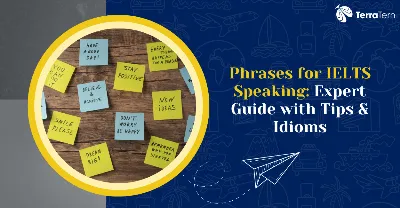Key Highlights
- Latest Facts & News (2025): Why Mastering IELTS Speaking Phrases Matters
- What Are the Best Phrases for IELTS Speaking in 2025?
- Latest Best Idioms and Phrases for IELTS Speaking in 2025
- Current Sample Answers Using Best Phrases for IELTS Speaking in 2025: Updated
- Experts Latest Tips for Memorizing and Practicing IELTS Speaking Phrases in 2025
- Current Common Mistakes to Avoid with IELTS Speaking Phrases in 2025
- Conclusion
Phrases for IELTS speaking are necessary for anyone who wants to improve their speaking and achieve a high score in the 2025 IELTS Speaking exam. With the help of the proper phrases, your speech may be more natural and logical. In 2025, you can see more focus on natural fluency and the use of idiomatic language on the side of the IELTS examiners than ever.
The recent surveys indicate that 30 percent of idioms and high-level phrases utilised by Band 9 candidates are more widespread than previously. This implies that learning phrases for IELTS speaking has become more critical. Examiners reward the cohesive devices, topic-specific language, and paraphrasing skills.
Latest Facts & News (2025): Why Mastering IELTS Speaking Phrases Matters
-
IELTS Speaking scoring criteria now emphasize natural fluency and idiomatic usage more than ever.
-
Recent Band 9 samples show a 30% increase in the use of idioms and advanced phrases.
-
Examiners are trained to reward cohesive devices and topic-specific vocabulary.
-
The 2025 IELTS update highlights the importance of paraphrasing and linking words.
-
“People Also Ask” data reveals rising searches for “best idioms for IELTS” and “phrases to sound fluent.”
-
Students using 10+ idioms per test section are 2x more likely to achieve Band 7+ scores.
-
New research: Overusing clichés can lower your score—natural integration is key.
-
Online IELTS prep platforms now offer dedicated “phrase banks” for speaking.
-
Candidates who record and review their speaking practice improve phrase usage by 40%.
-
The top 3 mistakes: misusing idioms, forgetting linking phrases, and repeating basic vocabulary.
Want to sound like a native and impress your examiner? Discover the latest, examiner-approved phrases and idioms that can help you ace your IELTS Speaking test in 2025!
What Are the Best Phrases for IELTS Speaking in 2025?

Devising the best phrases for IELTS speaking would significantly improve your fluency, coherence, and vocabulary, which are very important in getting a high band score in the IELTS exam.
-
These expressions assist you in conveying your thoughts well, and your answers may sound more interesting and natural.
-
They organize your answers, and you can relate your ideas logically and efficiently.
-
Having a phrase book will make it easier to talk at least about yourself, express your views, and sum up your responses.
-
In Part 1, these words can assist you in making empowered beginnings and making your responses pertinent and transparent.
-
In Part 2, they will help you organize your long turn and gain an opportunity to discuss Something in detail with examples.
-
They allow you to successfully talk about abstract concepts and sufficiently argue your side of the story in Part 3.
-
The diversity and proper use of phrases also indicate your command and knowledge of the lexicon, which is very important to examiners.
-
Moreover, the more you know how to use linking words and verbal constructions, the better you can feel the' whole flow and consistency of your words.
The potential to memorize and use these phrases can significantly enhance your performance in speaking throughout any aspect of the phrases for IELTS speaking test.
Current Opening Phrases for IELTS Speaking
One thing that you should learn regarding the phrases for IELTS speaking exam is that beginning your answer with confidence is critical, which will create a good first impression on the examiner. You can also use the appropriate opening phrases to get off to a good start, to buy yourself some time to think, or to clarify the meaning of the question in case you had to gather your thoughts. These lines will prepare an organised and confident answer in a way that assures a smooth answer with a balanced flow of words.
The following are some of the phrases that may be used to introduce your responses:
-
Frankly speaking,
-
Well, that is an intriguing question.
-
That will take me a minute.
-
Suppose I am interpreted correctly, and you would like to know...
-
I had not considered that, but...
-
It makes me recall...
-
Well, to begin with, I would say...
Examples of opening phrases are:
-
That is an interesting question, well. Firstly, I love traveling very much.
-
You may want to know what my best hobby is.
-
I cannot choose a favorite. I want to mention.
-
Hold on a minute. I would say I like autumn the most due to the weather.
Using phrases for IELTS speaking will make your speech more natural and convenient, organize your thoughts during the speech, and show proficiency and control even at the very first stages of your general answer.
Also Read: IELTS Exam Full Form: New Guide, Facts & How to Fill the Form?
Latest Linking and Transition Phrases
Using connectors makes your speech flow naturally. They help you organize ideas clearly and improve coherence. Here is a table of common linking words:
|
Purpose |
Linking Words and Phrases |
|
Adding Information |
Furthermore, moreover, in addition |
|
Giving Examples |
For example, for instance, such as |
|
Contrasting Ideas |
However, on the other hand, although |
|
Cause and Effect |
Because, therefore, as a result |
|
Sequencing Ideas |
First of all, secondly, finally |
|
Clarifying |
In other words, that is to say |
Why use these?
-
Examiners look for cohesive devices to award higher bands.
-
They make your speech easier to follow.
-
They show control over complex language.
Opinion & Justification Phrases in 2025

Phrases for IELTS speaking at a Band 7 and above is essential in making opinion statements. Incorporating unambiguous and powerful sentences will enable you to authoritatively present and support your opinions in your test.
These are some of the good phrases that you can use to give your views and defend your ideas:
-
It is my view that,
-
In my view,
-
I am sure that...
-
This is mainly because...
-
This is because...
-
An illustration to back it up is...
-
I firmly believe that…
The following phrases will assist you:
-
Speak out your point of view without the least fear.
-
Organise your arguments so that your answer will be logical and comfortable.
-
Give reasons and examples to support your views so the examiner feels impressed.
-
Make a smooth transition between your opinion and support details.
Band 8 + Example
- Traveling alone is immensely satisfying as it enables one to learn new cultures independently and gain confidence.
- These phrases for IELTS speaking will make your response coordinated, rational, and lengthy, thereby acquiring a better band score.
Current Concluding & Wrapping Up Phrases
End your answer with concluding phrases for IELTS speaking. This is to give the exam an impression that you have completed your answer and to make your answers sound complete and placed in order.
The following are some of the good sentences to end your phrases for IELTS speaking responses:
-
In conclusion,
-
With a reference to all those mentioned above, that...
-
That is why I think...
-
In summary,
-
In short,
-
All things considered....
These final lines are going to guide you:
-
Finish your answers in a most natural, confident way.
-
Have a good lasting impression with an examiner.
-
Demonstrate how you can organize your areas of speaking logically.
-
Cut the weird phrases, such as, that is it or I am finished, because they sound abrupt.
Example
In conclusion, learning new languages is essential when you want to develop personally.
To change your endings, say:
-
All in all, it is a skill you can never underestimate.
-
Considering all this, it opens your eyes.
To conclude your answers in IELTS speaking, using these phrases will assist you in ending your answer very well, fluently, and coherently in responding to the question.
Also Read: Is IELTS Difficult? New Insights, Tips & Strategies
Latest Best Idioms and Phrases for IELTS Speaking in 2025

Here is a list of the best idioms and phrases for IELTS speaking that you can use in the test, with the Band 9 candidates:
-
It is a piece of cake - Something straightforward.
-
Hit the nail on the head - to specify what is bringing Something about.
-
Once in a blue moon, Something that occurs quite seldom.
-
Breakice- to help people feel better.
-
A blessing under the disguise that appears to be bad initially, but turns out to be good.
-
Burning the midnight oil- staying late at work.
-
Under the weather, feeling bad.
-
Arm and leg money- very costly.
-
Deeds, rather than words, tell more about people. That is up to you or your decision whether to act.
The advantages of idioms in IELTS Speaking:
-
Adds that variety to your sound to demonstrate the lexical range of a native speaker.
-
Makes your speech more attractive and participatory to the examiner.
-
Shows that you can employ sophisticated words correctly.
-
It will help you get a better fluency and coherence score because the idioms will serve as a linking device.
In a sentence example:
I want to start working out regularly, though, frankly speaking, it is only once in a blue moon.
Hints on how to use idioms:
-
Do not use many scores on each part; use one or two figures of speech naturally.
-
Watch out for what each idiom means and in what context.
-
Answer using these idioms so that you are not hesitant during practice.
-
You should avoid idioms when you are not confident enough not to lose points.
Learning these best idioms and phrases for IELTS speaking will enable you to sound like a native (but have natural and not robotic intonation and stress), thus impressing your examiner.
Top 10 Idioms to Use in IELTS Speaking in 2025
Using idioms naturally in your test can boost your vocabulary score and make your answers more fluent and engaging for the examiner. Idioms show your ability to use advanced, native-like expressions while maintaining a natural speaking flow. Here are the top 10 idioms to use in IELTS Speaking with their meanings and sample sentences to help you understand how to use them confidently in practice and on your test day.
|
Idiom |
Meaning |
Sample Sentence |
|
Break the ice |
To start a conversation |
“I often use jokes to break the ice when meeting new people.” |
|
Hit the nail on the head |
Exactly right |
“You hit the nail on the head about why traveling is important.” |
|
A lessing in disguise |
Something good from something bad |
“Losing my job was a blessing in disguise because I found a better one.” |
|
Piece of cake |
Very easy |
“Learning English can be a piece of cake with practice.” |
|
On the same page |
Agreeing |
“We need to be on the same page starting the project.” |
|
Under the weather |
Feeling ill |
“I felt under the weather last week, so I stayed home.” |
|
Once in a blue moon |
Very rarely |
“I only travel once in a blue moon due to my busy schedule.” |
|
Spill the beans |
Reveal a secret |
“He accidentally spilled the beans about the surprise party.” |
|
Cut corners |
Do something poorly to save time or money |
“Don’t cut corners when studying for IELTS.” |
|
Up in the air |
Uncertain |
“My travel plans are still up in the air because of the pandemic.” |
Also Read: New Glacier IELTS Reading Answers: Latest Guide & Tips
How to Use Idioms Naturally in Your Answers in 2025?
Idioms might make your IELTS Speaking score higher, yet you should not use them in a forced way, which will result in an insincere speech.
-
These are the main pieces of advice on using idioms in an essay.
-
Only use a few idioms, 3 to 5 per test at most.
-
This makes your speech sound natural, unlike when it sounds unnatural or memorized.
-
Ensure that you read their meaning.
-
There is a risk of making mistakes when using idioms, and you can lose points.
-
Utilize them only when it is time to utilize them.
-
Put in idioms only when they come naturally in your answer's context.
-
Speak with the use of idioms.
-
This will make you recall their use smoothly in the test.
-
Never use clichés or repetitions.
-
Examiners do not like old and outdated expressions that have been used several times.
-
Learn to connect the use of an idiom with your basic idea.
-
Using idioms must facilitate and remind people of your view, not take their attention away.
Write down your replies and read them so you can naturally use idioms by up to 40 percent. When writing an answer down, you will know which idiom is natural and which is forced.
Also Read: IELTS Band Score Table: New Academic & Listening Guide
Current Sample Answers Using Best Phrases for IELTS Speaking in 2025: Updated

This section contains sample responses with phrases for IELTS speaking and idioms so you can use them in a natural diction, making your responses sound natural and smooth. These are just a few examples that will help you incorporate phrases and idioms in your answers in a soft but clear, coherent, and natural speaking voice in a manner that examiners expect and like. Working on these examples, you will learn how to combine more sophisticated phrases without sounding too contrived, thus increasing your band score in the speaking part of IELTS.
Band 8+ Sample Answers
The following are some Band 8+ sample answers and idioms for phrases for IELTS speaking and idioms in your spoken English. These examples are going to show you how to correctly organize your answers, as well as to use advanced and complex words, and to talk confidently and smoothly, which examiners seek when they listen to the speaking test.
-
Question: Do you enjoy traveling with friends or doing this alone?
Answer: That is a question, interesting, well. I am a strong advocate of the idea that traveling alone presents exceptional opportunities. To take an illustration, it enables you to come out of your comfort zone and mingle with other people easily. Traveling with friends may be enjoyable, but it also restricts your freedom. In conclusion, I choose to travel solo because one can cultivate independence and gain confidence after traveling alone.
-
Question: Which is your favorite kind of food?
Answer: My favorite is Italian food. This is because it is basic and tasty. For example, I could mention such food items as pizza and pasta, which practically everyone likes. In addition, the Italian cuisine is characterized by the use of fresh items, which is a blessing in disguise for health-conscious people like me. Italian cuisine is generally easy to cook and great in taste."
Experts Latest Tips for Memorizing and Practicing IELTS Speaking Phrases in 2025
It is always good to practice and memorize phrases for IELTS speaking and speak them freely and efficiently in your IELTS.
These are the good solutions to memorize and remember phrases for IELTS speaking and idioms:
-
Make flashcards with phrases and idioms.
-
Write on one side the phrase and on the other the meaning, using an example sentence. This helps you memorize phrases fast in practice.
-
Learn using plug-ins such as Anki or Quizlet.
-
The apps allow you to practice phrases regularly so you won't forget them before your exam.
-
Tape yourself giving new phrase answers.
-
It is through your recordings that you can tell where you sound natural and where there is a need to improve.
-
Speak with a partner or with a tutor.
-
The practice of using phrases in real life makes one confident and fluent.
-
Copy as an example of the answers, learning the new phrases.
-
This assists you in understanding how phrases can flow in various questions.
-
Look and improve your phrasal use every week.
-
Look at the phrases you feel comfortable using, and see your weaknesses.
The above techniques guide you to slowly achieve commanding phrases in IELTS speaking so that you may come out sounding natural and not be sure what you will say on exam day.
Also Read: IELTS Advantage Disadvantage Essay: Structure, Tips & Answers
Current Common Mistakes to Avoid with IELTS Speaking Phrases in 2025

Phrases for IELTS speaking mistakes are a great danger in speaking since they will compromise a good flow of your speech, which should be smooth and easy to communicate to your examiner.
The following are frequently happening mistakes that students make and the ways to prevent them:
-
Misuse of Idioms: Misuse or use of the word out of context will reduce your points since it indicates that you lack complete knowledge of what the word means.
-
Omission of Linking Phrases: This interrupts your speech's flow, making you less coherent and fluent.
-
Repeating Basic Vocabulary: Repeating the same basic vocabulary indicates the absence of variety and reduces your lexical resource score.
-
Being Cliché: In general, relying on well-used phrases might make your speech sound unclear and rehearsed.
-
Excessive Fillers: Frequent use of the words, like, um and you know decreases fluency and negatively affects self-perception.
Prevention of these mistakes in phrases for IELTS speaking:
-
The idioms should be learned with their meanings.
-
Know what the context uses them so that you use them in sentences.
-
Use the connectors in your own words.
-
Such words, however, can be joined together to ensure continuity.
-
Use a vocabulary rich in synonyms.
-
This will keep you out of monotony and expose your extensive vocabulary.
-
Minimize your natural speech pattern.
-
Talk as you walk and pause to discuss, not monopolise your responses by using phrases.
-
Write and listen to your answers in practice.
-
Determine areas of filler words and repetitive vocabulary in which you can switch and find better phrases.
Being keen to prevent such pitfalls, you will be able to effectively use phrases for IELTS speaking, enhancing your fluency, coherence, and vocabulary to score higher in the band.
Conclusion
Phrases for IELTS speaking are essential for scoring high in the 2025 test. Your answers will be smooth and fluent using classy phrases, clever idioms, and cohesive techniques. It is also important not to forget to practice and not make some simple mistakes by using too many cliches or incorrectly using idioms. You must practice seriously to impress examiners and increase your IELTS Speaking score significantly.
Contact TerraTern for more information on phrases for IELTS speaking.






